Related Research Articles
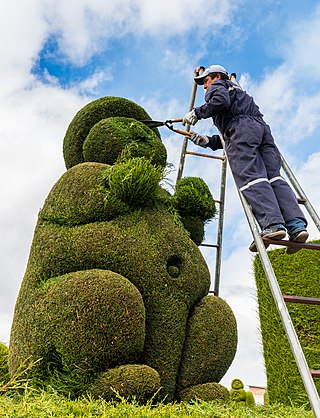
Gardening is the practice of growing and cultivating plants as part of horticulture. In gardens, ornamental plants are often grown for their flowers, foliage, or overall appearance; useful plants, such as root vegetables, leaf vegetables, fruits, and herbs, are grown for consumption, for use as dyes, or for medicinal or cosmetic use.

Raised-bed gardening is a form of gardening in which the soil is raised above ground level and usually enclosed in some way. Raised bed structures can be made of wood, rock, concrete or other materials, and can be of any size or shape. The soil is usually enriched with compost.

Forest gardening is a low-maintenance, sustainable, plant-based food production and agroforestry system based on woodland ecosystems, incorporating fruit and nut trees, shrubs, herbs, vines and perennial vegetables which have yields directly useful to humans. Making use of companion planting, these can be intermixed to grow in a succession of layers to build a woodland habitat. Forest gardening is a prehistoric method of securing food in tropical areas. In the 1980s, Robert Hart coined the term "forest gardening" after adapting the principles and applying them to temperate climates.
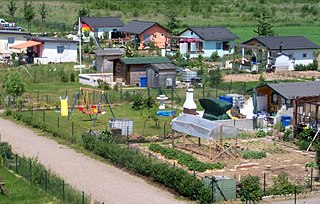
An allotment ( or in North America, a community garden, is a plot of land made available for individual, non-commercial gardening or growing food plants, so forming a kitchen garden away from the residence of the user. Such plots are formed by subdividing a piece of land into a few or up to several hundred parcels that are assigned to individuals or families. Such parcels are cultivated individually, contrary to other community garden types where the entire area is tended collectively by a group of people. In countries that do not use the term "allotment ", a "community garden" may refer to individual small garden plots as well as to a single, large piece of land gardened collectively by a group of people. The term "victory garden" is also still sometimes used, especially when a community garden dates back to the First or Second World War.
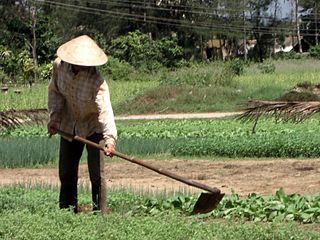
A hoe is an ancient and versatile agricultural and horticultural hand tool used to shape soil, remove weeds, clear soil, and harvest root crops. Shaping the soil includes piling soil around the base of plants (hilling), digging narrow furrows (drills) and shallow trenches for planting seeds or bulbs. Weeding with a hoe includes agitating the surface of the soil or cutting foliage from roots, and clearing the soil of old roots and crop residues. Hoes for digging and moving soil are used to harvest root crops such as potatoes.

Urban agriculture refers to various practices of cultivating, processing, and distributing food in urban areas. The term also applies to the area activities of animal husbandry, aquaculture, beekeeping, and horticulture in an urban context. Urban agriculture is distinguished from peri-urban agriculture, which takes place in rural areas at the edge of suburbs.
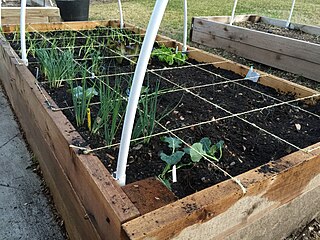
Square foot gardening is the practice of dividing the growing area into small square sections, typically 1 foot (30 cm) on a side, hence the name. The aim is to assist the planning and creating of a small but intensively planted vegetable garden. It results in a simple and orderly gardening system, from which it draws much of its appeal. Mel Bartholomew coined the term "square foot gardening" in his 1981 book of the same name.
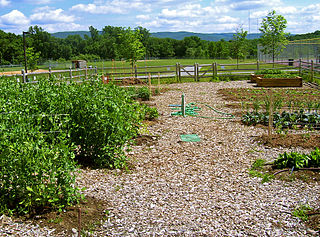
Organic horticulture is the science and art of growing fruits, vegetables, flowers, or ornamental plants by following the essential principles of organic agriculture in soil building and conservation, pest management, and heirloom variety preservation.

Guerrilla gardening is the act of gardening – raising food, plants, or flowers – on land that the gardeners do not have the legal rights to cultivate, such as abandoned sites, areas that are not being cared for, or private property. It encompasses a diverse range of people and motivations, ranging from gardeners who spill over their legal boundaries to gardeners with a political purpose, who seek to provoke change by using guerrilla gardening as a form of protest or direct action. This practice has implications for land rights and land reform; aiming to promote re-consideration of land ownership in order to assign a new purpose or reclaim land that is perceived to be in neglect or misused. Some gardeners work at night, in relative secrecy, in an effort to make the area more useful or attractive, while others garden during the day for publicity.

A community garden is a piece of land gardened or cultivated by a group of people individually or collectively. Normally in community gardens, the land is divided into individual plots. Each individual gardener is responsible for their own plot and the yielding or the production of which belongs to the individual. In collective gardens the piece of land is not divided. A group of people cultivate it together and the harvest belongs to all participants. Around the world, community gardens exist in various forms, it can be located in the proximity of neighborhoods or on balconies and rooftops. Its size can vary greatly from one to another.

Montagu Denis Wyatt Don is a British horticulturist, broadcaster, and writer who is best known as the lead presenter of the BBC gardening television series Gardeners' World.

The traditional kitchen garden, vegetable garden, also known as a potager or in Scotland a kailyaird, is a space separate from the rest of the residential garden – the ornamental plants and lawn areas. It is used for growing edible plants and often some medicinal plants, especially historically. The plants are grown for domestic use; though some seasonal surpluses are given away or sold, a commercial operation growing a variety of vegetables is more commonly termed a market garden. The kitchen garden is different not only in its history, but also its functional design. It differs from an allotment in that a kitchen garden is on private land attached or very close to the dwelling. It is regarded as essential that the kitchen garden could be quickly accessed by the cook.

Urban horticulture is the science and study of the growing plants in an urban environment. It focuses on the functional use of horticulture so as to maintain and improve the surrounding urban area. Urban horticulture has seen an increase in attention with the global trend of urbanization and works to study the harvest, aesthetic, architectural, recreational and psychological purposes and effects of plants in urban environments.
Patti Moreno, born in New York City, is an independent film producer and television personality best known for her work as Garden Girl on the hit web video series Garden Girl TV. Living and working in Boston, Patti published the hit website and e-newsletter Urban Sustainable Living from 2007-2011. Her goal is to pioneer the idea of gardening in small or urban environments, and to inspire and educate people everywhere to grow their own organic food and live sustainably. She is also the co-host of Growing a Greener World, author for Fine Gardening, and gardening expert for HGTV.

Seed swaps are events where gardeners meet to exchange seeds. Swapping can be arranged online or by mail, especially when participants are spread out geographically. Swap meet events, where growers meet and exchange their excess seeds in person, are also growing in popularity. In part this is due to increased interest in organic gardening and heritage or heirloom plant varietals. This reflects gardeners' interest in "unusual or particular varieties of flowers and vegetables", according to Kathy Jentz of Washington Gardener Magazine (Maryland).
Garden sharing or urban horticulture sharing is a local food and urban farming arrangement where a landowner allows a gardener access to land, typically a front or back yard, in order to grow food.
French intensive gardening also known as raised bed, wide bed, or French market gardening is a method of gardening in which plants are grown within a smaller space and with higher yields than other traditional gardening methods. The main principles for success are often listed as soil improvement, raised beds, close spacing, companion planting, succession planting and crop rotation. Originating in France, the practice is very popular among urban gardeners and small for profit farming operations.
There are many ways to garden in restricted spaces. Often a small or limited space is an issue in growing and cultivating plants. Restricted space gardens can be located on small lawns, balconies, patios, porches, rooftops, inside the home, or in any other available place. Gardening in small places can be applied to edible or floral plants. Growing food has many benefits including saving money; healthier, fresher, and better tasting food; knowledge of pesticide and fertilizer exposure. Gardening is a good form of exercise and has been proven to be therapeutic.
This is a list of books by Australian author Jackie French.

Foodscaping is a modern term for the practice of integrating edible plants into ornamental landscapes. It is also referred to as edible landscaping and has been described as a crossbreed between landscaping and farming. As an ideology, foodscaping aims to show that edible plants are not only consumable but can also be appreciated for their aesthetic qualities. Foodscaping spaces are seen as multi-functional landscapes which are visually attractive and also provide edible returns. Foodscaping is a great way to provide fresh food in an affordable way.
References
- ↑ Abramian-Mott, Alexandria (10 March 2005). "The dirt on alt gardening". LAT. Retrieved 21 January 2014.
- ↑ ALARCÓN, CLAUDIA. "Grow Great Grub: Organic Food From Small Spaces". Austin Chronicle. Retrieved 21 January 2014.
- ↑ Gomes, Kimberly (13 May 2012). "Author Gayla Trail adds insight on 'Easy Growing'". SF Gate. Retrieved 21 January 2014.